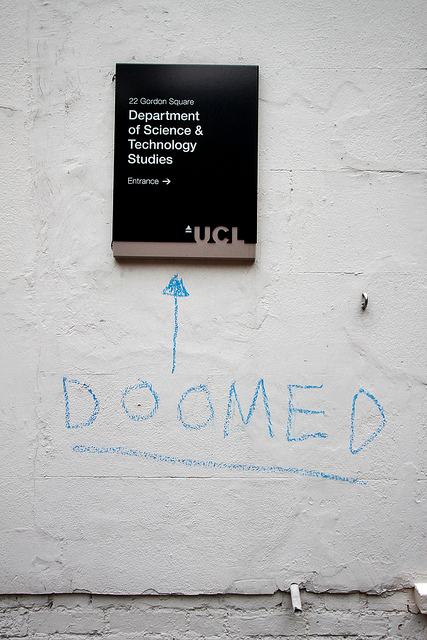 On 2 December, David Yaffe from the editorial board of FRFI spoke as a guest at a panel meeting inside the UCL occupation on the question of the cuts and the alternative.
On 2 December, David Yaffe from the editorial board of FRFI spoke as a guest at a panel meeting inside the UCL occupation on the question of the cuts and the alternative.
Also on the panel were Graham Turner, a former City economist, and representatives of Socialist Appeal, the Green Party and Workers Power. The meeting was organised by students who have been occupying the Jeremy Bentham Room in UCL since the second day of national action against fees and cuts on Wednesday 24 November.
During his speech, David gave a detailed analysis of the crisis, highlighting the parasitic character of British imperialism, bolstered by a powerful array of facts on the usurious character of the British economy, with particular reference given to the parasitic imperialist banks of the City of London. This Marxist-Leninist analysis was a refreshing contrast to the other speakers, who, in the main, gave social democratic arguments, or called for ‘reform’ of the Labour Party.
Much of the discussion was dominated by members of the organisation Workers Power, which had mobilised for the event. Workers Power called for a vote for the imperialist Labour Party in the previous election, as they have done repeatedly in the past. In the meeting these opportunists attacked FRFI for our support of revolutionary Cuba – a country which provides free access to education at all levels for all its citizens including adults returning to education.
Workers Power supporters did not, however, take up any of the points raised by David about the parasitic nature of British capitalism, which is at the root of today’s crisis.
Previous to this, FRFI activists have spoken at the UCL occupation about cuts to the health service and activists from RATB, a campaign in solidarity with socialist Cuba, screened their documentary film from a brigade to Cuba in 2008. The film sparked a discussion about how Cuba’s collective approach to socio-economic challenges presented a sharp contrast to the brutal cuts being implemented in wealthy Britain.
The UCL occupation has now entered its second week. Over the two weeks, the occupation has used imaginative direct action to draw attention to both the occupation and the attacks on education. These have varied from banner drops from the roof of UCL to a flashmob outside Topshop on Oxford Street. Some of the student occupiers, including FRFI supporters, were summoned to a meeting with university authorities and given warnings after adorning a statue with paper slogans against the attacks on university education. The university is currently taking the occupation to court, seeking a possession order to force occupiers out.




